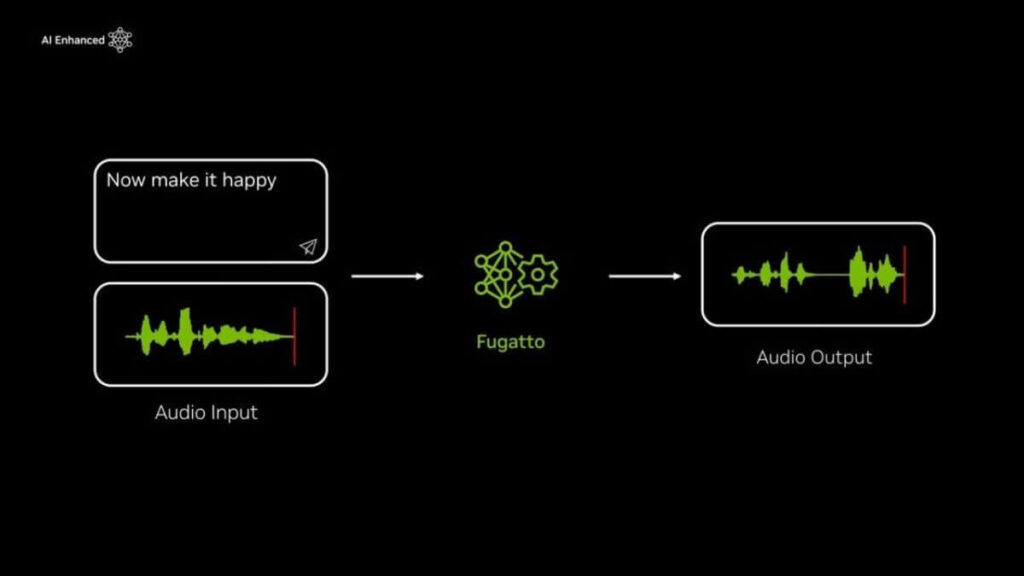Nvidia has launched Fugatto, an advanced artificial intelligence model for creating and modifying audio. Fugatto can produce music, and sound effects, and transform voices with unmatched creativity. This groundbreaking tool targets music producers, filmmakers, and video game developers.
Fugatto stands for Foundational Generative Audio Transformer Opus 1. It offers revolutionary features for sound and music design. The model can generate unique sounds and even transform existing audio pieces. However, Nvidia has clarified that Fugatto is not ready for public release yet.
What Makes Fugatto Unique?
Fugatto’s ability to create novel sounds differentiates it from other AI models. For example, it can make a trumpet sound like a dog’s bark. The model also allows creators to modify audio creatively. A piano melody can become a vocal line, or a spoken recording can get a different accent or emotion.
Nvidia’s innovation joins other AI tools like ElevenLabs and Descript. These tools also use text descriptions to generate audio and voices. But Fugatto takes it a step further by focusing on original sound creation.
Bryan Catanzaro, Nvidia’s vice president of deep learning research, explains the significance of this model. He believes generative AI will bring new opportunities for music and video game creators. Technology has already changed music in the past 50 years. Computers and synthesizers revolutionized sound production. Now, Fugatto aims to take the next big leap.
Nvidia Fugatto and Its Challenges
Nvidia is cautious about Fugatto’s release due to ethical and legal issues. The entertainment industry is already debating the impact of AI technology. For instance, actress Scarlett Johansson recently accused OpenAI of misusing her voice in an AI model.
Fugatto has been trained using open-source data, ensuring transparency in its development. Nvidia is carefully evaluating how and when it will release this model to the public. The company recognizes the risks involved with such powerful technology.
Ethical Concerns and Potential Misuse
Companies are concerned about the misuse of generative AI models. These models could create fake information or infringe on copyrights. Nvidia and other AI developers, such as OpenAI and Meta, are aware of these risks.
Despite their benefits, generative AI models need strict measures to prevent misuse. Companies have not yet finalized plans to address these issues and have not announced release dates for their most advanced AI tools.
Also read | How Do AI Detectors Work?
Applications of Nvidia Fugatto in Creative Fields
Fugatto promises to revolutionize creative industries. Musicians can experiment with sounds that were impossible to produce before. Filmmakers can enhance their projects with customized sound effects. Video game developers can create immersive audio experiences.
Generative AI models like Fugatto will empower creators to push artistic boundaries. With its ability to modify and transform sounds, Fugatto opens new possibilities in storytelling.
The Future of AI in Music and Audio
AI has already impacted many areas, from text generation to image creation. Fugatto represents a significant step forward in the audio field. By blending creativity with technology, it brings endless opportunities for innovation.
As Nvidia refines Fugatto, the company remains committed to responsible AI development. It continues to collaborate with experts to address ethical concerns. The future of music, film, and gaming will likely feature AI as a core component.
Also read | Google’s New Restore Credentials Tool Simplifies App Login
Conclusion
Nvidia’s Fugatto is a groundbreaking AI model for audio and music creation. It offers endless possibilities for sound design and creativity. While the model is not publicly available yet, it has already created excitement in the creative industries.
Nvidia is ensuring responsible development to avoid ethical and legal issues. The future looks promising as AI continues to revolutionize audio production. Stay updated for more news about Fugatto and its potential impact on creative fields.
Found this article interesting? Follow us on Twitter and LinkedIn for more updates!

